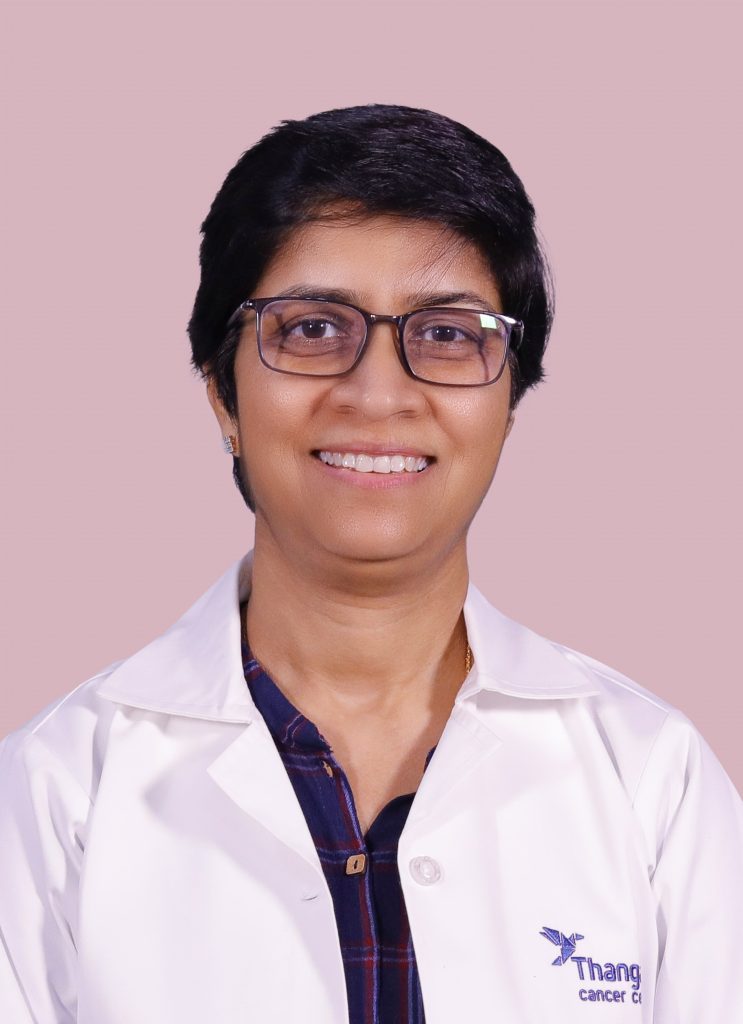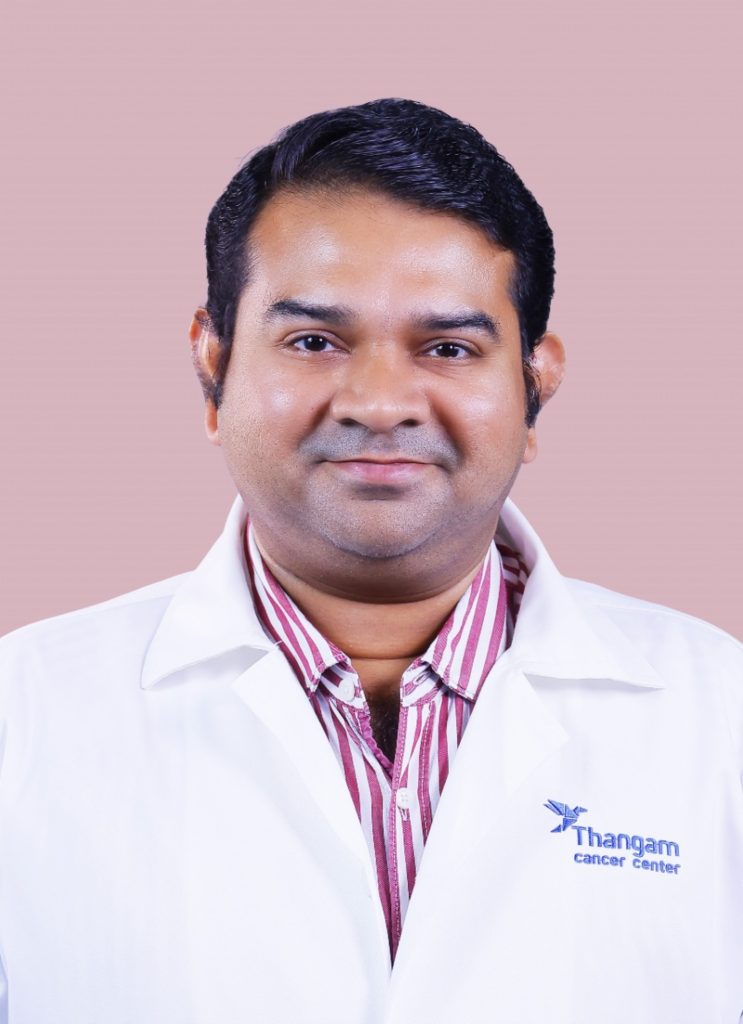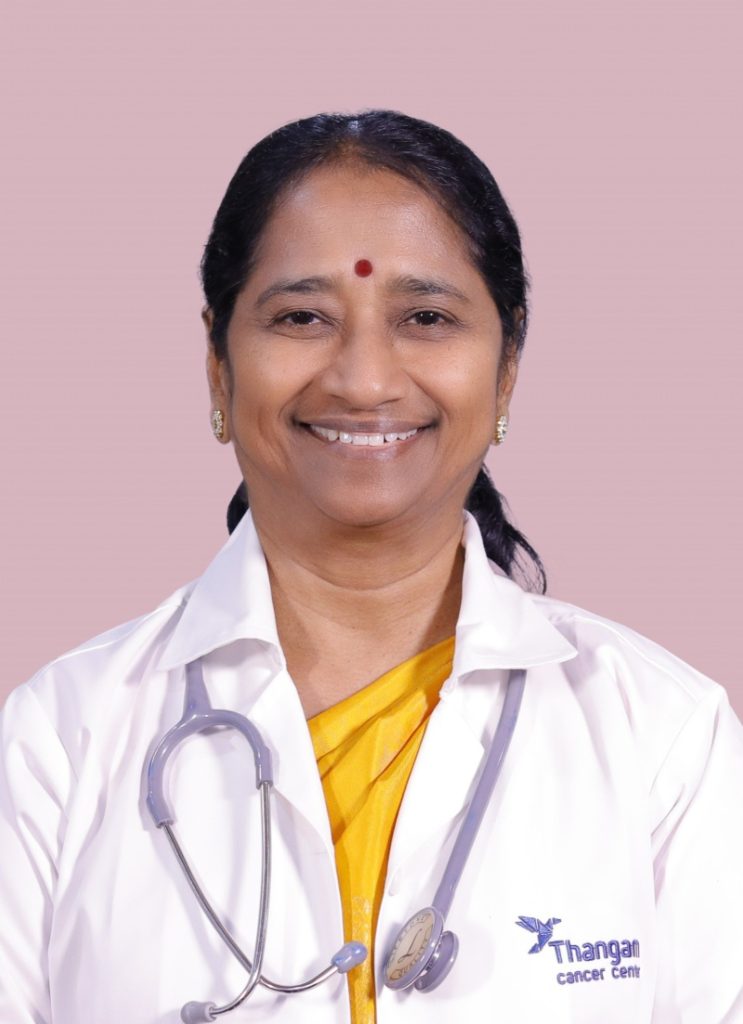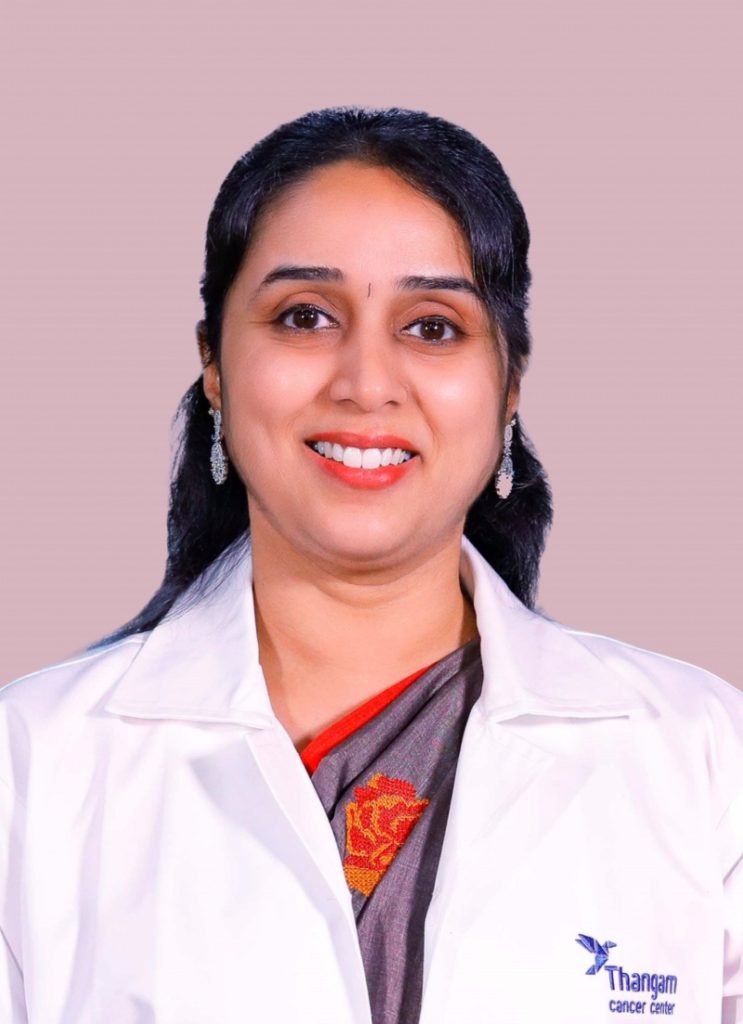Breast Cancer Treatment in India
Breast Cancer Treatment at Thangam
Surgical Treatment for Breast Cancer
Radiation Therapy for Breast Cancer
Chemotherapy in Breast Cancer Treatment
BREAST CANCER

Breast Cancer Care at Thangam Hospital
Breast cancer is the most common cancer affecting women globally and remains one of the leading causes of cancer-related deaths in women. However, thanks to advancements in early diagnosis and modern treatment strategies, survival rates are improving significantly.
At Thangam Hospital, we offer comprehensive care for patients seeking breast cancer treatment in India, supported by a multidisciplinary team of expert oncologists, surgeons, and support staff.
Recognizing the Symptoms of Breast Cancer
Early detection plays a crucial role in improving breast cancer outcomes. Common symptoms of breast cancer include:
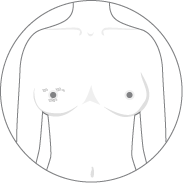
Lump in the breast:
A painless lump or thickening in the breast tissue that was not present before.

Changes in breast shape or size:
Sudden asymmetry, shrinkage, or unusual fullness.
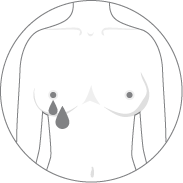
Nipple discharge or changes:
Bloody discharge, nipple retraction, or inversion.
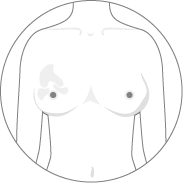
Skin changes:
Peeling, scaling, dimpling, or a texture resembling an orange peel.

Lumps in the armpit (axilla):
Swelling or presence of nodules near the underarm.
In advanced stages, symptoms may include persistent back pain, chronic cough, breathlessness, and loss of appetite.
Causes and Risk Factors of Breast Cancer
Breast cancer is closely linked to hormonal imbalances, particularly involving estrogen and progesterone.
Risk factors are categorized into non-modifiable and modifiable:
Non-Modifiable Risk Factors
Gender
Women are at a higher risk, though men can also develop breast cancer (approximately 1% risk).
Age
Risk increases with advancing age.
Family history & genetics
5–10% of breast cancers are hereditary, most often linked to BRCA1 and BRCA2 gene mutations.
Hormonal exposure
Early menstruation (menarche) and late menopause increase lifetime estrogen exposure.
Dense breast tissue
Women with dense breasts or a history of breast lesions (like atypical hyperplasia) are at higher risk.
Radiation exposure
Prior chest radiation, especially in younger patients, can increase risk later in life.
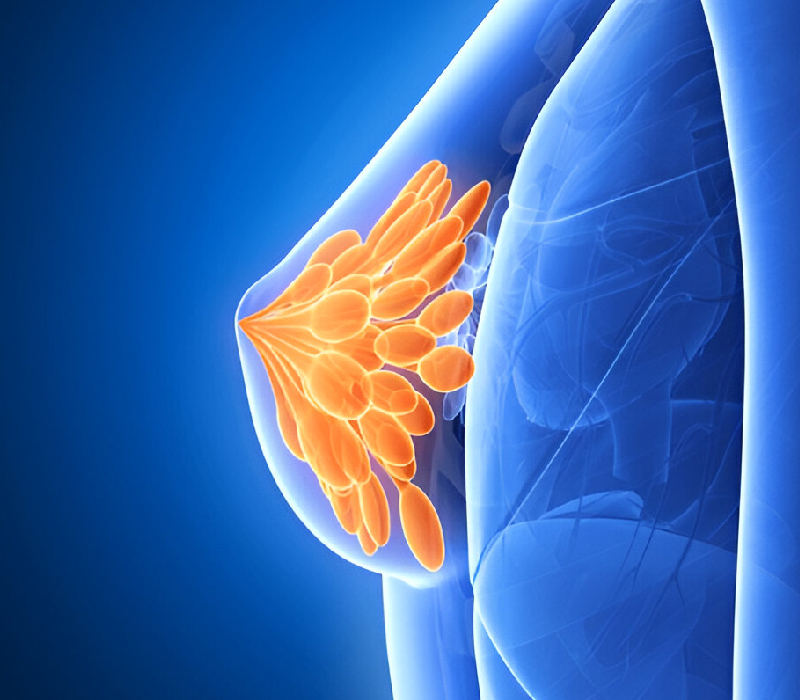

Modifiable Risk Factors
Obesity
Particularly post-menopause, excess fat increases estrogen levels.
Physical inactivity
A sedentary lifestyle contributes to weight gain and cancer risk.
Alcohol consumption
Even moderate alcohol intake is linked to increased risk.
Hormone therapy
Prolonged use of hormone replacement therapies or supplements can elevate estrogen levels.
Breast Cancer Prevention and Early Detection
At Thangam Hospital, we emphasize the importance of prevention and early screening to reduce the impact of breast cancer.

Lifestyle Changes for Prevention

Maintain a healthy
weight

Engage in regular physical activity

Limit or avoid
alcohol

Choose a balanced, nutritious diet
Breast Cancer Screening Methods
Self-Breast Examination (SBE)
Women aged 20 and above are encouraged to perform monthly self-checks to detect changes early.
Clinical Breast Examination (CBE)
A thorough breast exam by a medical expert, recommended annually from age 30.
Mammogram
A specialized breast X-ray used to detect early abnormalities. Recommended annually or biennially for women aged 40 and above.
Breast MRI
Used for high-risk individuals with strong family history or confirmed genetic mutations.
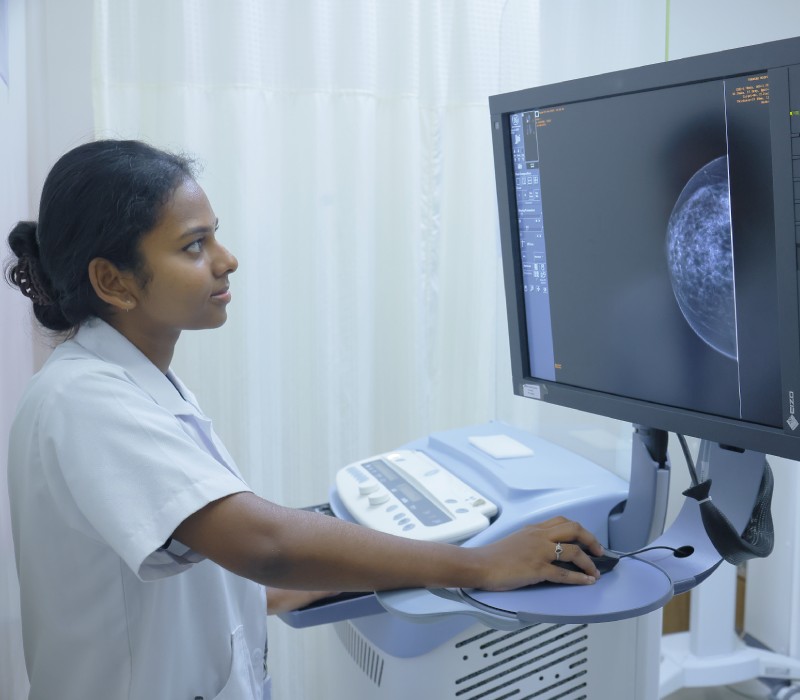
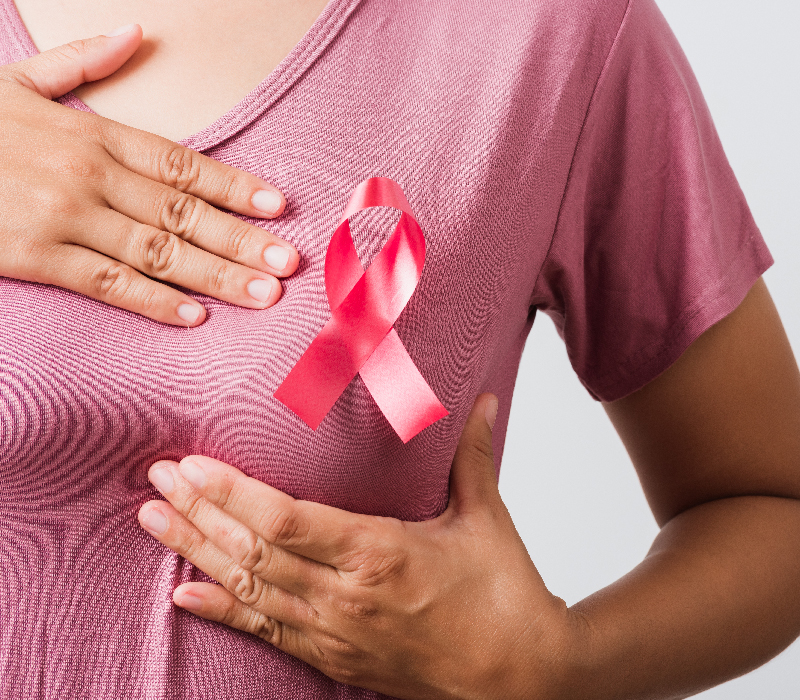
What to Do if You Discover a Lump
Not every breast lump is cancerous, but it’s vital to get it evaluated by a specialist.
Clinical Examination by a specialist
Imaging
Ultrasound (recommended for women under 40)
Mammogram (preferred for women 40+ or as needed)
Biopsy
A minimally invasive procedure to extract tissue for lab analysis and confirm the presence of cancer.
Breast Cancer Treatment at Thangam Hospital
Our approach to breast cancer treatment is personalized, multidisciplinary, and globally aligned with best practices. Once diagnosed, we determine the cancer stage using advanced imaging (Chest X-ray, CT, PET-CT, Ultrasound) to plan a treatment path.
Mastectomy: Removal of the entire breast and surrounding lymph nodes.
Breast Conservation Surgery (BCS): Removal of the tumor with preservation of the breast, combined with radiation therapy.
Breast Reconstruction: Cosmetic breast reconstruction using pedicle flaps or free flaps for improved appearance and emotional recovery.
Administered to target cancer cells in the body. Modern regimens have reduced side effects and are customized to each patient’s health and cancer type.
High-energy radiation (X-rays or proton therapy) is focused on the affected area to destroy remaining cancer cells and prevent recurrence.
Recommended based on hormone receptor status (estrogen/progesterone) to block or reduce the effect of hormones on cancer growth.
If HER2-positive, specific medications are used to target HER2 proteins and block their role in tumor growth.
Our Oncologists
At Thangam Cancer Center, our oncologists combine medical excellence with compassionate care. Each specialist plays a vital role in offering world-class treatment for breast cancer in India, ensuring comfort and confidence at every stage.
FAQs - Breast cancer treatment
How long does breast cancer treatment usually take?
The duration of breast cancer treatment varies depending on the stage and chosen therapies. Surgical recovery may take a few weeks, while chemotherapy or radiation can extend over several months. At Thangam Cancer Center, treatment schedules are tailored to ensure effectiveness and patient comfort.
What are the common symptoms of breast cancer?
Common breast cancer symptoms include a lump in the breast or underarm, changes in breast size or shape, nipple discharge, skin dimpling, and persistent breast or nipple pain. At Thangam Cancer Center, we recommend regular self-examination and screening tests like mammograms, as early detection greatly improves treatment success.
Who is at risk of developing breast cancer?
Women over 40, those with a family history of breast cancer, genetic mutations such as BRCA1/2, obesity, and lifestyle factors like smoking or alcohol use are at higher risk. Though less common, men can also develop breast cancer. At Thangam Cancer Center, we encourage individuals with these risk factors to undergo regular screening and preventive check-ups for early detection.
How is breast cancer diagnosed?
Diagnosis is made using clinical breast exams, mammography, ultrasound, MRI, and biopsy. At Thangam Cancer Center, advanced diagnostic tools ensure accurate and early detection, which is crucial for effective breast cancer treatment.
What are the different types of breast cancer?
The main types of breast cancer include ductal carcinoma in situ (DCIS), invasive ductal carcinoma, invasive lobular carcinoma, triple-negative breast cancer, and HER2-positive breast cancer. Each type responds differently to treatments such as surgery, chemotherapy, or targeted therapy. At Thangam Cancer Center, our specialists identify the exact type and create a personalized treatment plan for the best possible outcome.
What treatment options are available for breast cancer?
Breast cancer treatment often begins with surgery, which may include a mastectomy (removal of the breast) or a breast-conserving surgery (lumpectomy). Depending on the stage and type, additional treatments such as chemotherapy, radiation therapy, hormone therapy, targeted therapy, or immunotherapy may be recommended. At Thangam Cancer Center, our oncology team combines these options into personalized treatment plans to achieve the best outcomes for each patient.
What are 5 Early signs of breast cancer?
Five early signs of breast cancer include:
- A lump in the breast or underarm
- Change in breast size or shape
- Nipple inversion or unusual discharge
- Redness or scaling of breast skin
- Persistent breast or nipple pain
If you notice any of these symptoms, Thangam Cancer Center recommends immediate consultation and screening, as early detection offers the best chance of successful treatment for breast cancer.
What is the best treatment for breast cancer in India?
The best breast cancer treatment depends on the type and stage of the disease. For early-stage cases, surgery and radiation are commonly used to remove or control tumors. In more advanced stages, chemotherapy, targeted therapy, hormone therapy, or a combination of treatments may be recommended. At Thangam Cancer Center, our specialists provide comprehensive, personalized treatment plans using advanced technology, ensuring patients receive world-class care in India.
How much does breast cancer treatment cost in India?
The cost varies depending on the hospital, stage of cancer, and treatment type. On average, breast cancer treatment in India can range from moderate to advanced packages. Thangam Cancer Center offers cost-effective care without compromising quality.
Does Thangam Cancer Center provide early detection and screening facilities?
Yes, Thangam Cancer Center offers breast cancer screening services, including mammograms, ultrasound, and clinical breast exams. Early detection programs help identify cancer at the most treatable stage and improve survival rates.
How can I consult a breast cancer specialist at Thangam Cancer Care?
Patients can book an appointment with a breast cancer specialist at Thangam Cancer Care through the hospital’s website, helpline number – +91 73732 33333. Timely consultation ensures accurate diagnosis and the right treatment plan.
Are breast reconstruction options available after cancer treatment?
Yes. Thangam Cancer Center provides breast reconstruction surgery after mastectomy or lumpectomy. Breast reconstruction helps restore the breast’s natural shape and supports emotional healing, improving quality of life after cancer treatment.

